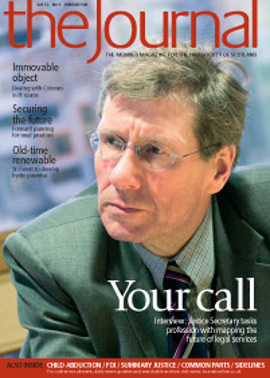Letter from South Africa

A mere 10 years ago a commentator who wished to write about current legal issues in another country would find it easiest to do so by travelling to that country and accessing a library there. Even then, law reporting could take a year or more, and anyone wishing to be completely up to date had to rely on obtaining quick access to court transcripts.
Today, that all seems so primitive, and so costly. A click of a mouse, a Google search, and a good broadband connection will bring the commentator all the information he or she needs, and more. So there is no urgent need for me to be here, sitting on the Zimbabwe bank of the Zambesi, in order to read Zimbabwe cases, nor for me to spend six months in South Africa to discover what are currently the major issues in South African family law. But here I am and, as if to prove the point, one of the cases I want to comment on this month is from the House of Lords (though it does coincidentally have a Zimbabwe connection).
One of my columns last year concerned a number of cases decided by the UK courts on the Hague Child Abduction Convention, a simple and straightforward piece of law with a clear set of aims and objectives, but which continues to generate a large amount of reportable litigation. Perhaps this is not surprising, since each opposed case requires court action, and each court action attracts legal aid, but it is more of a surprise that after 20 years, new issues of some legal import continue to arise from depressingly similar fact scenarios. So I return to the issue again this month.
Continuing discretion
A most interesting judgment has recently been handed down by the House of Lords in Re M and Another [2007] UKHL 55, decided in early December 2007. The lead speech was delivered by Baroness Hale of Richmond, one of the most insightful commentators on this (and other) issues. The scenario presented was relatively typical: two children, aged 13 and 10, had been born and bred in Zimbabwe where, after their parents’ separation, they lived with their father. On a visit to their mother, they were secreted out of the country and brought to the UK, where the mother sought (and failed to obtain) asylum.
Though originally the children wanted to go home, after some time their attitude changed and they expressed the wish to remain in England with their mother. Now, the mother had made it difficult for the father to trace the family and so, by the time the father made the Hague Convention application, the children had been in the UK for more than two years and, the judge at first instance held, were “settled” in the UK. This meant that there was no obligation under the Convention to order their immediate return: the facts raised an article 12 defence.
The issue before the House of Lords was whether the court had a discretion under the Convention to order return even when this defence was made out, or whether settlement took the case outwith the Convention entirely. The matter had some practical significance, in that if the Convention did not apply, a wider examination of the facts and circumstances would be required in order to allow the court to make a judgment based solely on the child’s welfare, while if the Convention continued to apply, the decision would be made taking account of the principles underpinning the Convention itself.
Baroness Hale warned against making too much of this distinction and, in the end, she held that the court retained a discretion under the Convention. As such, it is appropriate to take account of the aims of the Convention, including comity between contracting states, respect for foreign judicial processes, and deterrence of abduction in the first place (see especially para 42). These are not overriding considerations but merely factors to be taken into account in addition to welfare considerations. In particular, the immediate return of the child (which is the primary objective of the Hague Convention) is no longer a major aim in “settlement” cases, for the very reason that too much time has passed.
Taking off the gloss
Another important aspect of the case concerns how and when the court’s discretion can be exercised. Judges in both Scotland and England have expressed the view that even when a defence has been made out, it is only in “exceptional” cases that return should not be ordered. Insofar as this has become an additional test to be satisfied, Baroness Hale disapproved of the approach as an unwarranted gloss on the simple words of the Convention. It is sufficiently exceptional, she said, that more than a year has passed and the child is settled in the new environment.
There is further important guidance for the future in Lady Hale’s speech. She urges strongly (as she has done in other, non-abduction, cases) that a child-centric approach needs to be adopted in all Hague Convention cases. Thus the “comparative moral blameworthiness” of the parties is of little significance from the child’s perspective. Also, individual children should not be made to suffer by immediate return for the sake of general deterrence of the evil of child abduction worldwide. She also explicitly agreed with the judge at first instance that to return a child to a country with as many problems as Zimbabwe would not in itself be to place the child at grave risk of psychological harm or to place the child in an intolerable position. The standard for that defence to be established is high, as has been held in many earlier cases. The children were not returned.
Two curiosities
South Africa incorporated the Hague Convention into its law in 1996 and the most recent decision of the Supreme Court of Appeal on the issue, handed down in June 2007, is Central Authority v Houwert [2007] SCA 88 (RSA). Again, the facts are typical. The mother was South African, the father Dutch, and the child habitually resident in and national of the Netherlands. The mother and child travelled to South Africa, on return tickets, and shortly after arrival the mother informed the father that neither she nor the child would be returning to the Netherlands. The father sought return under the Hague Convention.
The primary issue in the case was whether the father had agreed to the child’s removal to, or acquiesced in his retention in, South Africa: this is the article 13(a) defence. The Supreme Court of Appeal pointed out that even if the defence were successful, the court retained the discretion to order return if this were considered appropriate in light of the aims of the Convention itself. But on an examination of the facts in the present case, the court had little hesitation in holding that the defence had not been made out: the mother had given the impression that the trip to South Africa was temporary, and the father had raised Hague Convention proceedings within weeks of being informed that the mother did not intend to return. A mandatory order of return was necessary.
There are two oddities in this case. First, the court at first instance had similarly found no defence under the Convention, but had then ordered the return of the mother rather than of the child. That alone meant the original order needed to be recalled, and a new one issued, ordering the return of the child. Secondly, the Supreme Court of Appeal’s order was very much more extensive than a mere order for return: it required substantial expenditure on the part of the father. The court awarded interim custody of the child to the mother and ordered the father to pay maintenance for the mother and child until the Dutch court had made its final determination. The father was also ordered to pay the air fare and other travel costs of the mother and child. Additionally, the father was required to vacate his home to allow the mother and child to live there while the Dutch proceedings were underway, to pay any medical or dental expenses incurred by either mother or child, and to provide the mother with a motor vehicle, paying all associated costs including oil and petrol.
None of this is required by the Hague Convention and the South African court was exercising its own inherent jurisdiction. As such, none of these incidental orders will be enforceable under the aegis of the Convention, though doubtless the father will feel obliged to abide by their terms in order to avoid accusations of bad faith in the custody dispute before the Dutch courts. It is, however, to be hoped that courts in other jurisdictions resist the temptation to go so far beyond the scope of the Hague Convention in the orders they make in addition to the order for the return of the child.
Kenneth McK Norrie is a Professor of Law in the University of Strathclyde
In this issue
- More than just a new year
- Let youth have its say
- "You sort it out"
- A Colossus in the room
- ARTL cometh
- Letter from South Africa
- Lay justice reborn
- Power flows
- Year of the Commission
- Down to brass tacks
- Step up for Brussels office
- Small is doable
- Watching their diets
- 2008: let the fun commence
- Act going to plan
- Preferential treatment?
- Giving it the works
- Scottish Solicitors' Discipline Tribunal
- "Charity begins at home" - but does it?
- Website reviews
- Book reviews
- Freedom has its boundaries
- Pointing which way?
- There may be trouble ahead






